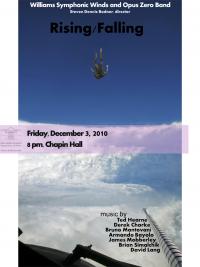
Symphonic Winds
Fri, December 3rd, 2010
9:00 pm
- This event has passed.

Steven Dennis Bodner, director
The Williams College Department of Music presents The Symphonic Winds and Opus Zero Band directed by Steven Dennis Bodner on Friday, Dec. 3 at 8 p.m. in Chapin Hall on the Williams College campus. This free event is open to the public.
That music can be described as “rising” or “falling” is certainly not a new ideas; not only do we speak of pitches as going up or down, but musicians ranging from madrigalists to Doctrine of Affection-adherents to Romantic lied composers have sought more varied and daring ways to marry music to words of directionality. Whether ascending to heaven or descending into hell—or maybe rising from the oceans, falling from the skies, or struggling to simply stay in place—music has often tried to depict, whether metaphorically or literally, the very process of motion. Infamous music critic Eduard Hanslick, in fact, even remarked that the very content of music was actually “tonally moving forms”—revealing that, for even a staunch absolutist, music is still, first and foremost, concerned with motion.
This concert, then, thematizes the very notion of motion, especially the opposed directions of “rising” and “falling.” The center piece of the concert is the Opus Zero Band’s performance of selections from Ted Hearne’s stunning and Gaudeamus Prize-winning Katrina Ballads. Hearne’s song-cycle consists of texts drawn entirely from news reports (ranging from a prophetic, 2001 Houston Chronicle report which stated that “New Orleans is sinking,” to an interview by a Biloxi, MS, resident who lost his wife during the flood, “We got up the roof and the water came and just opened up”), providing a scathing examination of the destruction of Hurricane Katrina and the government’s woefully inadequate response. In direct and potent musical terms, Hearne reveals that, as the water level rose, New Orleans sank—and the devastation increased. As Allan Kozinn wrote in The New York Times, “What [Hearne] was after was not a documentary about Katrina as the people of New Orleans experienced it, but rather an inflected, interpreted record of how the rest of the country watched it unfold—that is, as the news media presented it, complete with resoundingly famous sound bites.” Like American music and New Orleans itself, Katrina Ballads is an omnivorous and multi-stylistic work, at once both ironic and dramatic, driving and reflective. (Opus Zero Band performed selections of Katrina Ballads on October 1 at Mass MoCA in North Adams, and will be performing the complete, hour-long work on May 13, 2011.)
Also on the concert are two movements from Bruno Mantovani’s Le Sette Chiese, inspired by the “Seven Churches” complex in Bologna. As Mantovani notes, “The distinctive architectonic features of [the complex], as well as its religious function, stimulated me to think about the space and its poetry.” For this evening’s concert, Opus Zero will be performing the movements inspired by The Church of San Giovanni-Battista and its connected La Crypte, described by Mantovani as, “a notable building, comprised of a short nave and an elevated apse, which is marked off by two large paintings, which the faithful, however, cannot properly discern from the nave. This inspired me to a long, ascending movement in the form of glissandi of the ensemble in quarter tone intervals and leads to a first antiphonal element.
The crypt… is reserved for meditation lies under the stairs which lead to the apse in the San Giovanni-Battista church. The space is furnished with numerous ornaments, pervaded with sunlight and decorated with much goldleaf. I chose a continuous movement with resonance, containing echoes of Gregorian chant and exaggerated forms, which symbolize the clarity of the ensemble.” So, while the first movement allows the sounds of the faithful to slowly wind their way to the top of the church, the second movement plunges us into the solemn depths of the crypt.
The Symphonic Winds will present the New England premieres of two works for band and electronics—one which rises (James Mobberley’s Ascension) and one which falls (Derek Charke’s Falling from Cloudless Skies)—as well as a piece which obstinately stays in place (Armando Bayolo’s Fanfare: Treadmill). These three works, each in its own way, reveal both the powerful virtuosity and fragile transparency of the modern wind band. Rounding out the program will be two chamber works, David Lang’s Increase and Brian Simachik’s Like a Man. For this program, the Opus Zero Band and Symphonic Winds will be joined by the Handbell Quintet, as well as student conductors Chaz Lee ’11 and Noah Fields ’11.
*****
The Williams Symphonic Winds is a 60-member ensemble dedicated to performing the most significant music written for large wind ensemble; the Opus Zero Band was formed four years ago (originally as Chamber Winds) to perform mostly new music for variable instrumentations, ranging from trios to chamber orchestra and everything in between. Now in his eleventh year as Music Director, Steven Dennis Bodner has developed the ensembles’ identity as leading proponents of the performance of new music at Williams College. The ensembles have commissioned and premiered a number of works by contemporary composers, including Williams faculty and alumni. Recognized as one of the premier wind ensembles in New England, the Symphonic Winds performed at the 2006 College Band Directors National Association Eastern Division Conference; the Opus Zero Band performed at last spring’s conference in West Chester, PA. Recently, Opus Zero Band has collaborated with MASS MoCA to present acclaimed work-in-progress performances of David Neumann’s/Eve Beglarian’s feedforward and Philip Miller’s Hottentot Venus. The ensembles have been noted both for their adventurous and creative programming and for the quality of their performance, described as “astounding” by the Berkshire Advocate and “amazingly good” by composer Louis Andriessen.